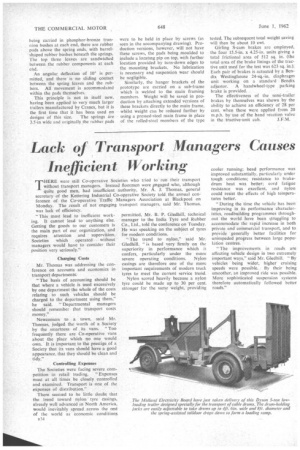Lack of Transport Managers Causes
Page 102

If you've noticed an error in this article please click here to report it so we can fix it.
Infficient Working THERE were still Co-operative Societies who tried to run their transport without transport managers. Instead footmen were imgaged who, although quite good men, had insufficient authority, Mr. A. J. Thomas, general secretary of the Kettering Industrial Co-operative Society told the annual conference of the Co-operative Traffic Managers Association at Blackpool on Monday. The result of not engaging transport managers, said Mr. Thomas, was lack of efficiency.
"This must lead to inefficient working. It cannot lead to anything else. Getting the goods to our customers is the main part of our organization, and requires attention and supervision. Societies which operated without managers would have to consider their position very seriously."
Charging Costs
Mr. Thomas was addressing the conference on accounts and economics in transport departments.
"The basis of accounting should be that where a vehicle is used excessively by one department the whole of the costs relating to such vehicles should be charged to the department using them," he said. "Departmental managers should remember that transport costs money,"
Newcomers to a town, said Mr. Thomas, judged the worth of a Society by the smartness of its vans. "Too frequently there are Co-operative vans about the place which no one would own. It is important to the prestige of a Society that its vans should have a good appearance, that they should be clean and tidy."
Controlling Expenses
The Societies were facing severe competition in retail trading. "Expenses must at all times be closely controlled and. examined. Transport is one of the expenses of distribution."
There seemed to be little doubt that the trend toward nylon ' tyre casings, already well advanced in North America, would inevitably spread across the rest of the world as economic conditions
B34
permitted, Mr. B. P. Gledhill, technical manager to the India Tyre and Rubber Co., Ltd., told the conference on Tuesday. He was speaking on the subject of tyres for modern conditions.
"The trend to nylon," said Mr. Gledhill, "is based v,ery firmly on the superiority in performance which it confers, particularly under the more severe operating conditions. Nylon casings are therefore one of the more important requirements of modern truck tyres to meet the current service trend.
Nylon scored heavily because a nylon tyre could be made up to 30 per cent. stronger for the same weight, providing
cooler running; bead performance was improved substantially, particularly under tough conditions; resistance to brakedrum heat was better; cord fatigue resistance was excellent, and nylon could resist the effects of high temperatures better.
"During the time the vehicle has been improving in its performance characteristics, roadbuilding programmes throughout the world have been struggling to accommodate the rapid increase in both private and commercial transport, and to provide 'generally better facilities for unimpeded progress between large population centres.
" The improvements in roads are affecting vehicle design in two extremely important ways," said Mr. Gledhill. " By vehicles being wider, higher cruising speeds were possible. By their being smoother, an improved ride was possible. More sophisticated suspension systems therefore automatically followed better roads."






































































































































































